Read Earlier Parts here:
Part 1
Part 2
Question 11: From your answers to the ten questions so far, it is clear that ANS is totally against all sorts of deception or buvabaji—falsehood of so-called godmen. Kindly explain what exactly do you oppose and how do you carry out or practice this opposition in reality?
Answer: Do you know what a pseudo-Godman says? “Arre, my son! I know what is good for you and I also know that you will not understand it.” I have no objection to the first part of the sentence because my mother too says the same. However, I have objection to the part: ‘I also know that you will not understand it.’ While saying this, the pseudo-Guru says in his mind, ‘Don’t be afraid, I’m there to back you.’ Asaram Bapu gave an interview to the Times of India in which he said, “What do we Baba Lok do? 1. We add to our devotee’s material prosperity. 2. We change his destiny; we change the future of his life! We set him from the cycle of birth-and-death. 3. We put an end to his sexual desire and natural passions, and create in him feelings of pity, forgiveness, love and peace.”
But didn’t God do this work up to now? Then how did Asaram Bapu took over God’s work? The reason is that people think this is possible owing to the concept of avatar prevalent in our country. I haven’t met a single man so far who said to me, “You are doing wrong work.” People say to me, “Doctor! You are doing the work of eradication of superstition; it is certainly good work. Buvas and Babas are really scoundrels. They cheat people; exploit women.” After saying all this in one breath, people say, “But Doctor! You know, all Babas are not like that! Our Baba is real and truly great. Others are all crooks!” There is a poem of Mangesh Padgaonkar about this subject. If I recite it, you will know why I am against all this. Samarth Ramdas wrote Dasbodh (Guidance of a Saint) and Mangesh Padgaonkar, looking at the situation around us today, wrote Udasbodh. (Guidance of Despair) There is a poem entitled Buvabaji in it which says:
People are lean, emaciated/ Broken from inside//
Terrorised by invisible fear/ They all need support//
Everyone needs here/ Some strong Godman//
Who will remove lice of all mental worries//
An official says, Jai Sai / Before taking the bribe//
He is still scot-free/ Owing to Baba’s blessings//
We shouldn’t try to seek/ We shouldn’t fight//
We shouldn’t challenge/ Anything in life//
Backbone is emaciated/ All are flatterers before power//
Chanting Godman’s name/ Leads everyone to frenzy//
It is clear that buvabaji—deception by godmen—gives us a different sort of intoxication. We undertake three activities against it: One, we openly fight it. Two, we challenge miracles. Three, we awaken people and arouse them organising aggressive programmes on a large scale.
Question 12: If we look into the role of ANS in opposing all types of buvabaji, deception by godmen, it appears that you and your activists reject religion; but herds of common people need religion to live a moral life. Don’t you think that this strong rejection of religion of yours simply means taking away the very support required by society for living a moral life?
Answer: No! If I meet a person in our country who says, “I am religious and therefore owing to my love for or fear of God, I follow morality in my behaviour,” I am willing to shake hands with him wholeheartedly and embrace him. All the people who are arrested and sent to prison are religious minded, they believe in God. How do you explain this anomaly? People who believe in God and religion should not be in prison. God and religion should tell them, ‘Don’t do all these immoral acts.’ Or we find everywhere in our country just one complaint by people: ‘No work is done in our country without corruption.’ How can we explain this? In our country, 99.99% people are religious, and yet this country is Number One in corruption! It clearly states that there is something wrong. If people are moral in behaviour owing to the support they get from religion, ANS—the Committee for Eradication of Superstition—respects them totally. However, we feel that we need to have basic rationalism in order to behave in a moral way. In schools, there can be two ways to maintain silence in a class: 1. Teachers need to communicate effectively to students, ‘If all of you keep quiet, you can study well.’ 2. Teachers need to beat students, if they are undisciplined and disorderly. The result: students keep quiet. Though students keep quiet following both methods, which one is better? First or second? Obviously the first because a student thinks, ‘I have decided to keep quiet; it is my decision.’ In the second alternative, a student thinks, ‘I have taken this decision owing to the fear of the teacher who may beat me. If he is transferred, I will be free to misbehave again!’ Hence, I work for the movement which believes in moral or rational behaviour of man. But if there are people who lead a moral life owing to the impact of region, I respect them wholeheartedly.
Question 13: If you reject religion, do you also reject God in any form or format?
Answer: This is also a question which I have to answer in detail. The first point is this: While asking me the question, ‘Do I reject God?’ you have not given me your definition of God. If you had asked me: Do you reject God who has created and controlled the world, who creates miracles and fulfils man’s oaths positively, I would have certainly said, ‘Yes, I reject this God.” But if you had asked me, ‘Do you reject the idea of God that Gadage-baba had accepted? Then I would say, ‘No!’ You might not be knowing that Gadage-baba used to go to holy Pandharpur every year on Ashadhi and Kartiki Ekadashi days for thirty years. But he never undertook any fast on those days. He never went to the temple. He would sweep with his own broom the bank of the river Chandrabhaga made dirty by the visiting devotees. When he would stand before the people to give a devotional performance called kirtan, he would ask the audience of thousands of devotees in front in the local dialect, “My people, have you seen God?” People thought, “What a question! Haven’t we come here for the same?” So, they would answer, “Yes, we have seen God!” Baba would ask, “It’s strange! You have seen God? Where is your God?” People thought, “This fellow doesn’t know anything.” They would say, “Our God Vitthal lives in the temple. He stands on a brick, he is not fair, his hands are placed on his waist, beside him stand Goddess Rakhumai.” Baba would say, “It’s strange! Your God lives in the temple? My God lives in my heart.” People still didn’t understand. Then Baba would ask, “Does your God bathe?” People answered, “Of course, he does!” Baba would say, “Who bathes your God?” People would reply, “We bathe our God!” Baba would say, “Arre! Your God who is not able to bathe himself, how can he shower good luck on you?” Baba would further ask, “Does your God put on a dhoti?” People would reply, “We do it for Him!” Then Baba would ask, “Arre, if your God is not able to wear his dhoti himself, how can he put on you the cloth of good luck?” Baba would ask further, “Don’t you offer prasad as naivedya for your God to eat? People would say, “We do.” Baba would ask, “What do you do after placing naivedya befor the God?” People would reply, “We sit beside the plate, keeping a stick in our hand.” Baba would ask, “For what?” People would reply, “To drive away crows or dogs that would come to eat God’s food.” Baba would say, “Arre, if your God is unable to protect the food served to Him, how can He protect your lives?”
Friends! Baba would then ask a million-dollar question, “Has anyone seen a God standing before you alive?” People would be confused and look here and there. A man would be standing barefoot beside Baba, with his rough face, sunken cheeks, white beard and wearing poor quality khadi clothes. Baba would point his finger towards him and say, “Arre, look at Karmaveer Bhaurao Patil here. He works hard to teach kids of Mahar and Mang communities. You should call him God. Look at Gandhiji; he toils so much for the country. Call him God. Arre, try to give education to illiterate people, offer medicine to sick people, give shelter to those who are homeless, serve poor and suffering people, help mute animals showing sympathy for them… Oh, my people, God lives in these people. Arre, God does not live in temples. God lives in our heart. Only the greedy pujari’s hungry stomach lives there!”
It means, the answer of my organisation depends on: ‘Who do you call God?’ If you say, “God is the revelation of morality,” I would reply, “My rational mind directs me to behave morally; but if your God directs you to follow morality, I would wholeheartedly welcome it.”
Question 14: Your organisation ANS does not approve of the support of God and religion; however, social reformers generally do look upon them as support. In your lectures, it seems, you always talk about the legacy of social workers. You just spoke about Godage-baba and Karmaveer Bhaurao Patil. What is it that makes you look upon it as support?
Answer: Social reformers from Maharashtra have done substantial work for education and for labourers and farmers. We accepted the same. However, we were not able to understand fully their legacy of rationalism based purely on intelligence. Look at our tradition. Lokhitwadi (Rao Bahadur Gopal Hari Deshmukh) was born in 1823 and Prabodhankar Keshav Sitaram Thakare died in 1973. This is an unbroken tradition of hundred and fifty years. What did my movement get from it? Mahatma Phule had asked a question,
If mantras and rituals can bring rainfall, why do people die without water?
If many brahmin women are barren, why do rituals not give them children?
If by repeating prayers and performing religious rituals had given us rainfall, why would people who had wholesale contract of rituals die in a miserable way in severe drought conditions? The example explains the importance of cause-and-effect relation. Justice Ranade said, “The impact of customs and conventions intoxicates people. As a result, you are unable to decide what is right and what is wrong. Then human intelligence slows down and man goes astray from the path of his duty.” Going still ahead, Gopal Ganesh Agarkar said, “Oh, people! Why are you afraid of thought-provoking debates? Agarkar belonged to Pune. In the same city today, there was disturbance in Dabholkar’s programme. It clearly shows people are still afraid of thought-provoking debates and discussions. People should have said instead, “Let Dabholkar speak today. We will speak tomorrow.” What Swatantrya Veer Savarkar said was interesting. He spoke about the pooja of banyan trees performed on the ‘Vatsavitri’ Day. He said, “As long as a banyan tree is standing, it will offer shade to the wayfarer sitting underneath. When the same banyan tree would become old and be in a dilapidated condition, it would fall on the same wayfarer. The banyan tree, which does not know whether to offer shadow to a wayfarer or to fall on his head, need not be worshipped. If it is worshipped for fulfilment of one’s own wishes, it would mean the ‘pooja of falsehood.’ (Savarkar’s usage) It clearly underlines that Satyamev Jayate (Truth alone triumphs) is our motto and Asatyamev Vartate (Speak only falsehood) is our present-day reality.
Then came Rajarshi Shahu Maharaj. He actively fought against caste system. Then came Dr. Babasaheb Ambedkar who tried to offer morality as an alternative to dharma or religion. We find this legacy extremely impactful. What is important in this is that the legacy of most of them is of active social reformers. These stalwarts said and practised what they preached.
Question 15: We have now reached at a crucial stage in our interview. You wish to present, and you have already presented, that you do not need God and religion in order to live a moral life. On the other hand, you are stating powerfully your legacy of social reformers. All social reformers have also emphasized the need of morality in human life. However, a few years ago, ANS had undertaken a public activity entitled: ‘Let us go to Shani-shinganapur to steal!’ It was announced in the papers. Do you wish to say that that stealing is morally good, and if not, how do you teach such immorality to the society?
Answer: Stealing is certainly an immoral act. However, when I spoke about going to Shani-shinganapur to steal, fortunately there was no electronic media. Or else it would have become a breaking news! The fact was this: A journalist said to me, “You say that there are no miracles, but you know, a miracle takes place at Shani-shinganapur. There are no doors to houses; and if one steals something from a place, the thief either becomes blind or goes mad. What is your reaction to this?” I replied, “I will accept the responsibility to steal at Shani-shinganapur, and to punish me will be the responsibility of Shani—but the police and the villagers should not interfere in the matter.” The journalist used his ingenuity and gave the news a spicy title to our agitation: Narendra Dabholkar says, ‘Let me go to Shani-shinganapur to steal!’ Now, the point here is that though stealing is bad, spreading false delusions in society is even worse. In reality, had there been no thefts taking place at Shani-shinganapur, I would have said, “Okay, set aside the superstition; it is important that stealing shouldn’t take place.” But actually, you find heaps of complaints about stealing in policemen’s diaries at Shani-shinganapur. The headmaster of the school there is caught in a dilemma: if important registers are kept in cupboards without locks in the school, there is the risk of losing the job; and if he didn’t keep them there, he has to take the risk of losing his reputation! Hence, he takes all the registers home every day and brings them back to school in the morning next day. Moreover, if thefts are not taking place owing to the influence of God Shani, the donation box in front of the God’s idol should be kept open! But the problem is that, if it kept open, the money is lost; and if it is locked, the divine influence of God becomes questionable. They found out an ingenuous solution to this problem. They kept a huge box to collect donations. It has no lock, no key. There is a big enough crack or opening at the top to insert money. When the box is full, it is turned upside down; there is a metal sheet at the bottom fixed by nut-bolts. It is opened, money is taken out and the box is fitted and placed in its normal position again. Is this a symptom of your faith in God? That is why we need to examine delusion that creates superstition. Nothing can progress if you object to the examination of delusion and truth. That is why we said so; we wanted to give a shock to people’s minds. That was worded in a catchy and spicy manner, and hence the problem cropped up.
- Dr. Narendra Dabholkar
(Founder Andhashraddha Nirmulan Samiti, Former Editor of Sadhana Weekly)
Interviewer: Vinod Shirsath (Editor, Sadhana Weekly)
Translated by Vilas Salunke
vilasalunke@gmail.com
Tags: ANS Andhshradhha nirmulan samiti andhashradhha nirmulan d narendra dabholkar interview prashna tumcha uttar dr dabholkaranche Load More Tags

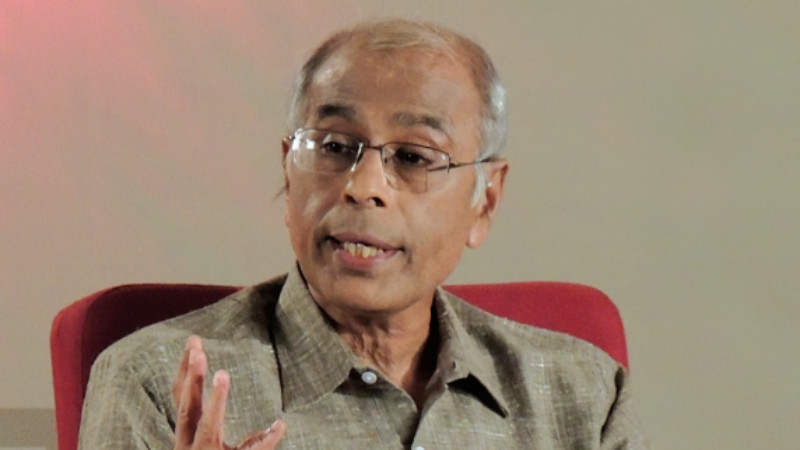
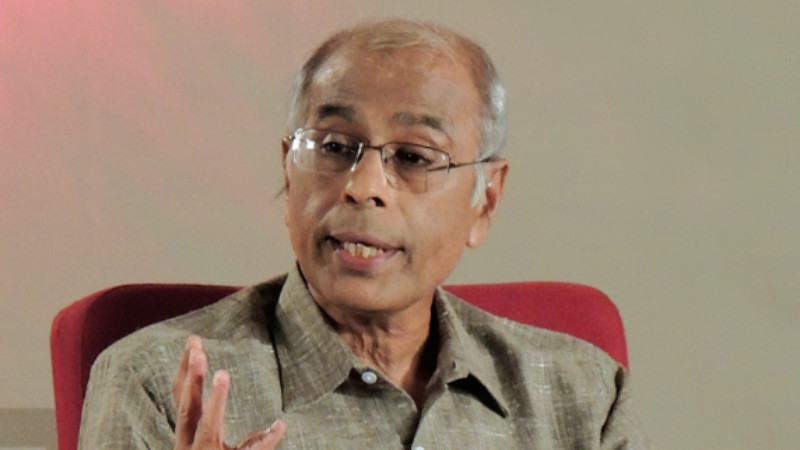
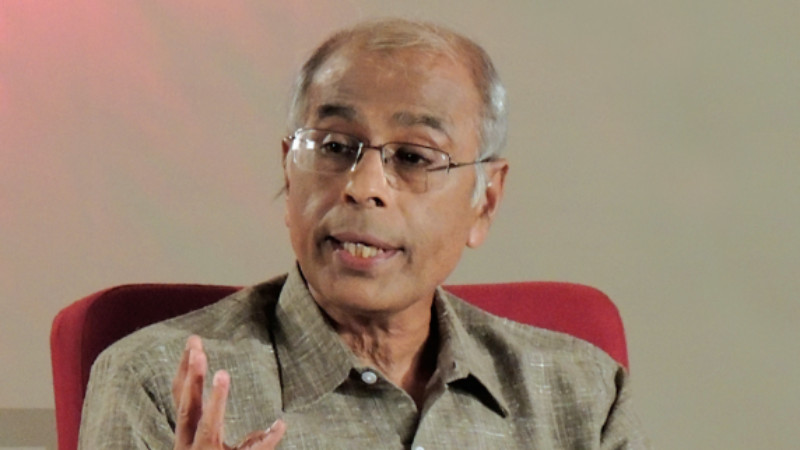
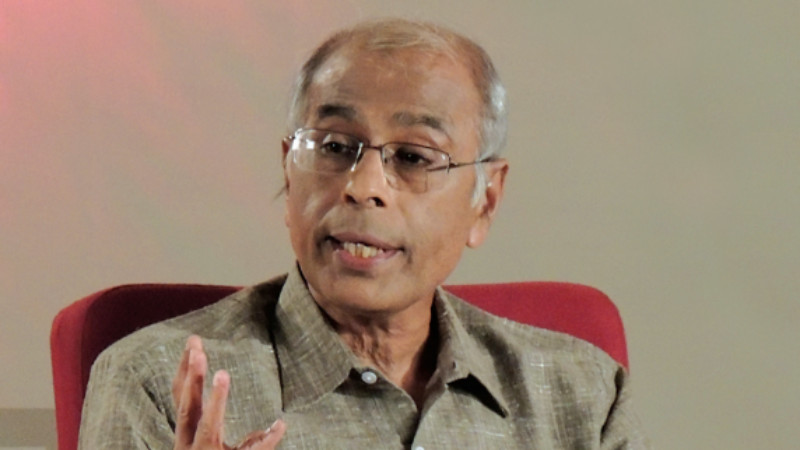
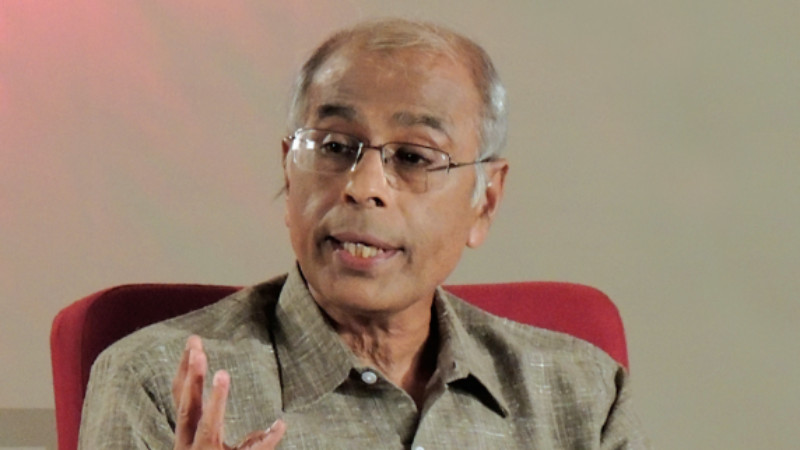
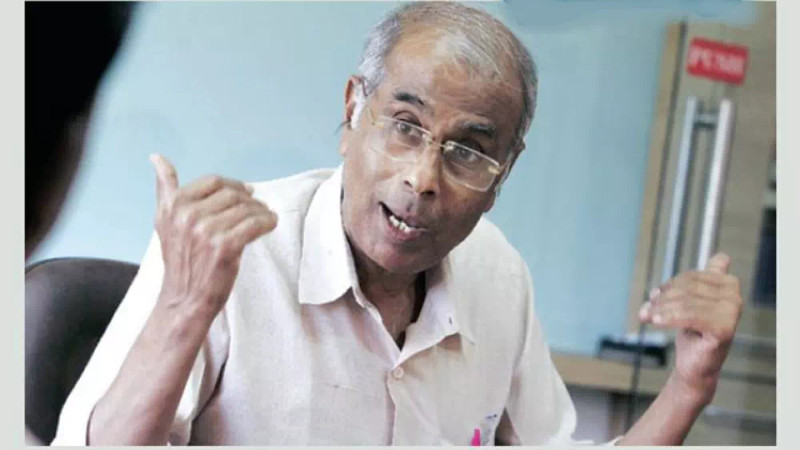


























Add Comment